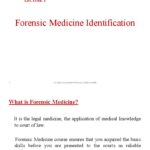The allure of forensic science, often fueled by primetime television dramas, frequently leads to the pivotal question: what is the pecuniary compensation for a forensic scientist? While the portrayal on the screen might depict glamorous crime scenes and immediate breakthroughs, the reality is a profession requiring meticulous analysis, painstaking methodology, and a compensation structure that varies widely based on a constellation of factors.
Averaging a monthly salary requires unpacking several key considerations that influence the financial remuneration within this specialized field. Experience, education, specialization, geographical location, and employer type all play a significant role in determining a forensic scientist’s monthly earnings. Let’s delve into these contributing variables to provide a more nuanced understanding of the pecuniary landscape.
The Impact of Educational Attainment and Experiential Learning
The educational foundation laid by a forensic scientist often acts as a strong determinant of their earning potential. Entry-level positions typically mandate a minimum of a bachelor’s degree in a natural science, such as biology, chemistry, or forensic science itself. However, advanced degrees, such as a Master’s or Ph.D., can significantly augment earning capabilities. These postgraduate qualifications equip individuals with specialized knowledge and advanced research skills, making them more attractive candidates for higher-paying positions within research institutions, government agencies, and private laboratories.
The accumulation of experience is equally pivotal. A neophyte forensic scientist fresh out of academia will understandably command a lower salary than a seasoned professional with decades of casework under their belt. As experience accrues, so does proficiency in analytical techniques, courtroom testimony, and the interpretation of complex forensic data. This expertise translates directly into increased value for the employer and, consequently, higher compensation for the individual.
Specialization: Carving a Niche in Forensic Science
Forensic science is not a monolithic entity; it comprises a diverse array of specializations, each demanding unique skill sets and contributing to varying salary scales. Forensic DNA analysts, for example, who scrutinize genetic material to identify suspects or victims, often find themselves in high demand due to the critical role DNA evidence plays in modern criminal investigations. Similarly, forensic toxicologists, who analyze biological samples for the presence of drugs and poisons, are essential in determining the cause and manner of death in suspicious circumstances. Other specializations, like forensic entomology (the study of insects in legal contexts) or forensic anthropology (the examination of skeletal remains), can also command competitive salaries based on their rarity and specific application within the legal system.
Choosing a specialization that aligns with both personal interest and market demand is a crucial strategic decision for aspiring forensic scientists. Some specializations may require additional certifications or training, which, while demanding in the short term, can yield substantial long-term financial benefits.
The Geographical Gradient: Location, Location, Location
Geographical location exerts a profound influence on salary levels across virtually all professions, and forensic science is no exception. Metropolitan areas, particularly those with high crime rates or a significant concentration of forensic laboratories, tend to offer higher salaries to attract and retain qualified professionals. States with robust forensic science infrastructure and well-funded law enforcement agencies also tend to provide more competitive compensation packages. Conversely, rural areas or states with limited resources may offer lower salaries due to a reduced demand for forensic services and a lower cost of living.
The cost of living in a particular region must also be factored into the equation. A seemingly high salary in a city with exorbitant housing costs and taxes may ultimately translate into a lower disposable income compared to a more modest salary in a region with a lower cost of living. Conducting thorough research on salary benchmarks and cost of living indices is essential when evaluating job offers in different geographical locations.
Employer Type: Public vs. Private Sector Dynamics
The type of employer also plays a significant role in determining a forensic scientist’s monthly salary. Forensic scientists are typically employed by government agencies (e.g., federal, state, or local law enforcement), private forensic laboratories, or academic institutions. Government agencies often offer stable employment and comprehensive benefits packages, but salaries may be somewhat lower compared to the private sector. Private forensic laboratories, on the other hand, may offer more lucrative salaries, particularly for highly specialized positions or those requiring extensive experience. However, job security and benefits packages may vary depending on the size and financial stability of the company.
Academic institutions typically employ forensic scientists in research or teaching roles. Salaries in academia can vary widely depending on the institution’s funding, the faculty member’s rank, and the demand for their expertise. While academic positions may not always offer the highest salaries, they often provide opportunities for research, publication, and professional development, which can be highly rewarding for individuals passionate about advancing the field of forensic science.
In summation, pinpointing an exact monthly salary for a forensic scientist is akin to navigating a complex labyrinth. The interplay of education, experience, specialization, location, and employer type creates a multifaceted landscape where generalizations can be misleading. While entry-level positions may start at a modest compensation, the potential for financial advancement increases significantly with further education, specialized training, and the accumulation of practical experience. Aspiring forensic scientists should carefully consider these factors when charting their career paths and evaluating potential employment opportunities to ensure they are adequately compensated for their invaluable contributions to the pursuit of justice.










Leave a Comment